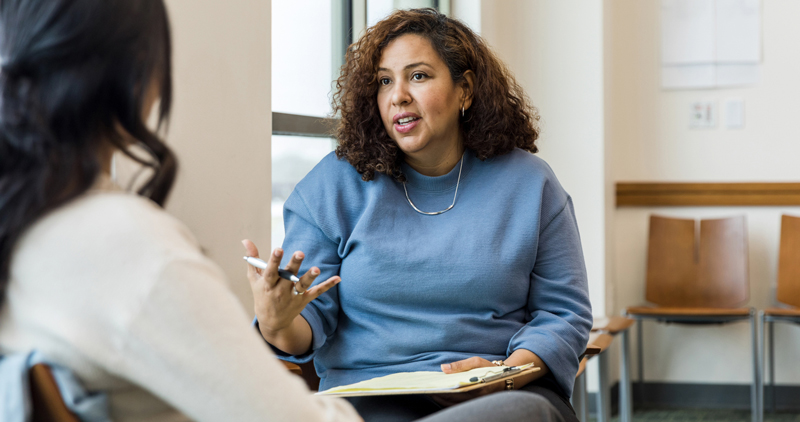Almost one million more young people will get access to school mental health support this year.
Does that mean the government is delivering its pledges? Schools Week takes a look…
1. Specialist mental health professionals in every school – but not until 2030
The government pledged to provide access to mental health professionals in every school so “every young person has access to early support to address problems before they escalate”.
The Department for Education today said half of all schools now have access to a mental health support team (MHST).

Funding of £49 million will enable the teams to reach 60 per cent of schools – an extra 900,000 pupils – by March next year.
Rollout will be “prioritised based on NHS identification of local need” to reach the most vulnerable children first.
Bridget Phillipson, the education secretary, said expanding support was “one of the single biggest steps we can take to improve children’s life chances, make sure all pupils are getting the very most out of school and deliver excellence for every child”.
However, the government said it would not reach its pledge to reach every school until 2029-30 – the end of parliament.
MHSTs are made up of specialists trained by the NHS. They aim to identify and tackle mental health issues early on, using interventions “from group sessions to build children’s resilience to 1:1s helping to manage anxiety”.
But Place2Be, the children’s mental health charity, said the teams were “really only one part of the solution. Alone, [they] won’t be enough to truly meet the government’s manifesto commitment…nor effectively tackle the mental health difficulties facing young people today.”
It was also “vital” that young people could also access “high-quality, targeted clinical support at their school”.
2. 8,500 new mental health staff – but is it enough?
Labour pledged to recruit “an additional 8,500 new staff” to help treat both children and adults. There have been no further details about the timeline.
A damning report by the British Medical Association (BMA) published last June, the month before Labour took office, highlighted the “declining state” of England’s mental health workforce.
It had seen “little growth” in the past decade, while the number of people using mental health services had soared 21 per cent since 2016.
NHS England figures show the hospital and community health services (HCHS) mental health workforce remained at about 109,000 between 2013 and 2017. But it has climbed steeply in recent years and was at 157,000 in December. Nurses and health visitors made up most of the increase.
But Dr Andrew Molodynski, the BMA’s mental health policy lead, said the rise was “nowhere near fast enough to meet the sharp rise in demand” for children’s mental health services.
Andy Bell, the chief executive at the Centre for Mental Health, said 8,500 more workers could end up being a “slower rate of increase than the past five years”.
The government said new mental health support team workers would form part of this figure.
Stephen Kinnock, the health minister, said in January that the staff on the teams must have “at least a level three vocational qualification, or equivalent level of relevant study”.
But Dr Sebastien Chapleau, an assistant director of Citizens UK, said this fell below what was needed to support those who would otherwise end up on CAMHS waiting lists.
Teams should feature professionally trained counsellors who could offer a greater depth of support, the group said this week in letter to Bridget Phillipson.
3. Reducing mental health waiting times – but by how much?
In its election manifesto, Labour said waiting lists for mental health support were “too high”, and “shamefully so” for young people. The party pledged to “bring waiting times down and intervene earlier”.
A lack of public data makes progress unclear.
The children’s commissioner is due to publish her annual report on the state of children’s mental health services this weekend.
The report “presents a mixed picture” for children seeking mental health support, said a spokesperson, with waiting times remaining an issue for “thousands of children”.
However, data in the commissioner’s report will only go up to April 2024, before Labour took office.
YoungMinds analysis of NHS England data showed a 52 per cent increase in young people waiting more than a year for CAMHS support – rising from 51,866 in 2022-23, to 78,577 in 2023-24.
Olly Parker, the head of external affairs at YoungMinds, said many young people still “face long waits while their mental health deteriorates”.
4. Hubs in every community – but millions needed
Labour pledged to create a new national network of “Young Futures” hubs, which would tackle knife crime and rising mental health issues by providing “open access” mental health services.
Lauded last year as a major prevention-focused reform rather than a “sticking plaster”, Yvette Cooper, the home secretary, said there would be a targeted programme in every area. The hubs would be open to young people aged 11 to 24, providing early intervention through drop-in services.
In March, Youth Access said there were “over 60” of the hubs across the country, but they were not yet “universally available”.
It estimated £169 to £210 million of annual funding was needed “to roll out a hub in every local area”, with an extra £74 to £121 million needed for set-up costs.
It urged the government to “commit to a multi-year funding package” in the upcoming spending review.
Neither the DfE nor health department responded to Schools Week’s question about how many hubs are now open, how many are planned, and the roll-out timeline.
Meanwhile, critics have said asking young people to access mental health support outside schools was “a recipe for disaster”.
Chapleau said he feared young people “won’t go” and that it was “much better to integrate things within school”.
‘We’re working to raise healthiest generation of children’
Phillipson said the government was “already turning the tide” on the mental health crisis after inheriting a system “full of challenges”.
Mental health took a major hit during the Covid-19 pandemic, particularly among young people.
An NHS England study in 2023 found 21 per cent of 8 to 16-year-olds had a “probable” mental health problem – seven percentage points higher than in 2017.
Meanwhile, cuts to services have left schools shouldering the burden. A Teacher Tapp poll of more than 2,600 teachers last year found 84 per cent were spending an increasing amount of time helping pupils with mental health issues.
A DfE study published this week has also suggested a “causal” link between mental ill health and children missing school.
The government has committed to investing an extra £680 million in mental health services, with a health department spokesperson pledging that “every child should have access to mental health support”.
They also said the “world’s first” 24/7 mental health crisis support services had been launched.
“Through our Plan for Change, we will raise the healthiest generation of children in our history by reforming the NHS to give mental health the same attention and focus as physical health.”
















A Mental Health Team approach does seem to me a good start towards accessing care in our schools. Drop in hubs may mean quicker and more accessible access for those young people as and when they need accessible out of school hours M/H support.
However P2Be can and does provide an on the spot M/H service already in schools, reducing stigma and helping young people to develop a language that can enable them to have that M/H conversation. When they do reach out to that 24/7 crisis team they have the words with which to better describe their feelings and thoughts. They often require a ‘go to’ trusted adult and despair of long waiting times for Camhs appointments.
They need structured ‘joined up’ accessible M/H support that’s run by well trained, reliable trusted adults, private space, a sense of Security and safety, wrap around care, informed aware teachers with community insight, and preferably parental/ carer backup. All of that P2Be already provide so please place the funding where it can provide the best, most relevant, most professional, most compassionate, already in existence, value for money.